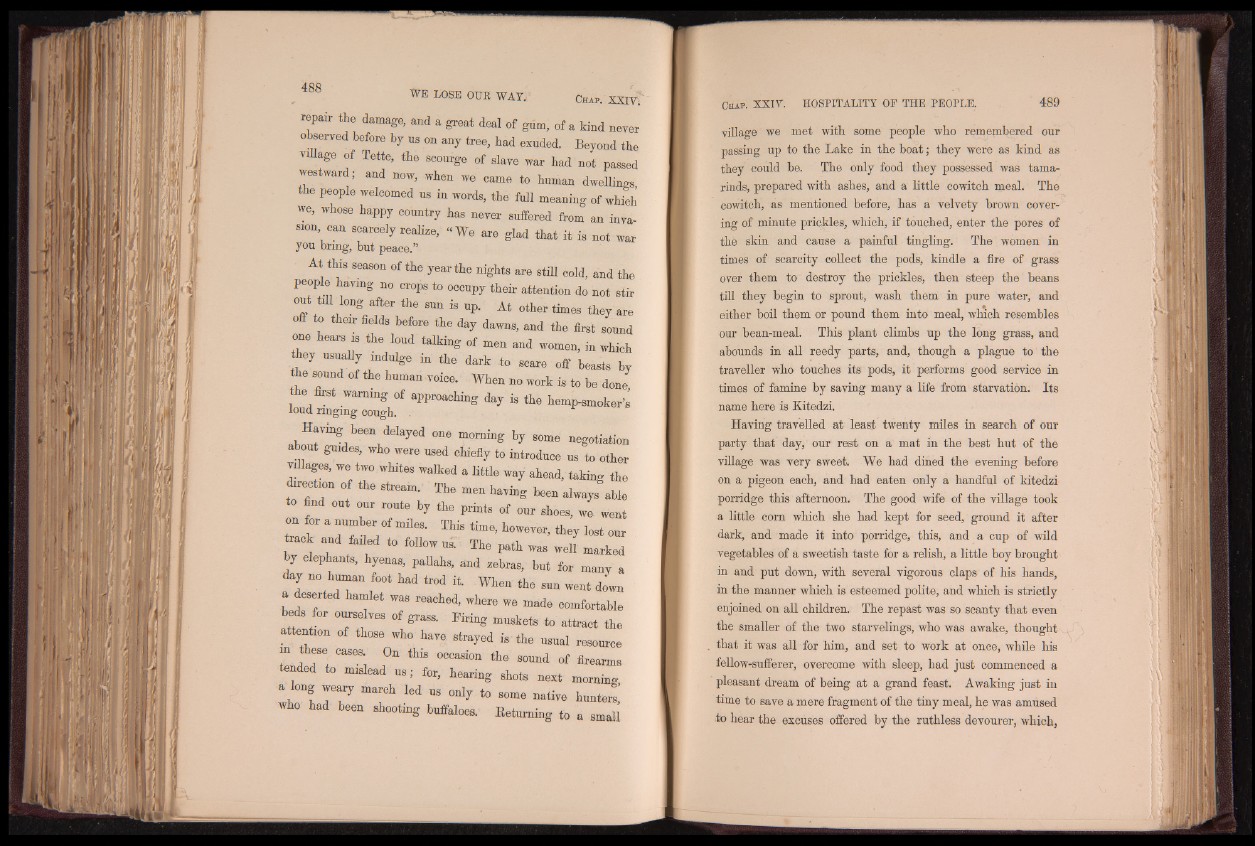
repair the damage, and a great deal of gum, of a kind never
observed before by us on any tree, had exuded. Beyond the
village of Tette, the scourge of slave war had not passed
westward; and now, when we came to human dwellings
the people welcomed us in words, the full meaning of which
we, whose happy country has never suffered from an invasion
can scarcely realize, «We are glad that it is not war
you bring, but peace.”
At this season of the year the nights are stiff cold, and the
people having no crops to occupy their attention do not stir
out till bug after the sun is up. At other times they are
off to their fields before the day dawns, and the first sound
one hears is the loud talking of men and women, in which
t h e y usually indulge in the dark to scare off beasts by
the sound of the human voice. When no work is to be done
he first warning of approaching day is the hemp-smoker’s
loud ringing cough. .
Having been delayed one morning by some negotiation
about guides, who were used chiefly to introduce us to other
Tillages, we two whites walked a little way ahead, taking the
direction of the stream. The men having been always able
to find out our route by the prints of our shoes, we- went
on for a number of miles. This time, however, they lost our
track and faded to follow us/ The path was well marked
by elephants, hyenas, pallahs, and zebras, but for many a
day no human foot had trod it. When the sun went down
a eserted hamlet was reached, where we made comfortable
beds for ourselves of grass. Hiring muskets to attract the
attention of those who have strayed is the usual resource
in these cases On this occasion the sound of firearms
tended to mislead us; for, hearing shots next morning
a long weary march led us only to some native hunter!,
who had been shooting buffaloes. Eeturning to a small
village we met with some people who remembered our
passing up to the Lake in the boat; they were as kind as
they could be. The oxdy food they possessed was tamarinds,
prepared with ashes, and a little cowitch meal. The
cowitch, as mentioned before, has a velvety brown covering
of minute prickles, which, if touched, enter the pores of
the skin and cause a painful tingling. The women in
times of scarcity collect the pods, kindle a fire of grass
over them to destroy the prickles, then steep the beans
till they begin to sprout, wash them in pure water, and
either boil them or pound them into meal, which resembles
our bean-meal. This plant climbs up the long grass, and
abounds in all reedy parts, and, though a plague to the
traveller who touches its pods, it performs good service in
times of famine by saving many a life from starvation. Its
name here is Kitedzi.
Having travelled at least twenty miles in search of our
party that day, our rest on a mat in the best hut of the
village was very sweet. We had dined the evening before
on a pigeon each, and had eaten only a handful of kitedzi
porridge this afternoon. The good wife of the village took
a little corn which she had kept for seed, ground it after
dark, and made it into porridge, this, and a cup of wild
vegetables of a sweetish taste for a relish, a little boy brought
in and put down, with several vigorous claps of his hands,
in the manner which is esteemed polite, and which is strictly
enjoined on all children. The repast was so scanty that even
the smaller of the two starvelings, who was awake, thought
that it was all for him, and set to work at once, while his
fellow-sufferer, overcome with sleep, had just commenced a
pleasant dream of being at a grand feast. Awaking just in
time to save a mere fragment of the tiny meal, he was amused
to hear the excuses offered by the ruthless devourer, which,